Choosing the Right Country for Your Surrogacy Journey: What You Need to Know
Selecting the right country for your surrogacy journey is one of the most important decisions you will make. This choice affects not only the legal outcome but also the emotional, financial, and logistical aspects of building your family. In this article, we explore why this decision carries more weight than many realize and how to navigate it wisely.
Understanding the Legal Landscape
Surrogacy laws vary dramatically from country to country, and even within regions. To make things more complex, these laws can change suddenly due to shifts in political or social priorities. Professionals working in the field have at times been caught off guard by abrupt legal changes, and unfortunately, many online resources do not provide accurate or up-to-date information.
In some cases, surrogacy laws are deliberately misrepresented by agencies or lawyers with financial interests. For example, one source claimed: “Surrogacy in the USA is widely practiced even though there are no specific regulations on this matter.” In reality, surrogacy has been legally practiced in the United States for over 40 years, with most states offering clear, enforceable laws.
Navigating the wealth of information available online can be overwhelming. However, it is essential to ensure you are equipped with accurate and up-to-date knowledge as you embark on this journey of creating your family through surrogacy.
How to Evaluate a Country’s Surrogacy Laws
When researching surrogacy options abroad, keep the following in mind:
Review primary legal documents.
Always review relevant legal documents such as laws, bills, regulations, or court cases directly rather than solely relying on secondhand information. While you may not understand every detail, familiarizing yourself with the law’s content is important.
Adhere strictly to the law.
Deviating from the legal framework, even unintentionally, can lead to unexpected complications or serious legal consequences. For example, if a country permits only uncompensated surrogacy and outlines specific procedures for establishing parentage, it is important to follow these steps precisely. Even offering a small additional payment as a gesture of thanks could be seen as a violation of the law and jeopardize the entire arrangement.
Learn from precedent.
Learning from real cases can underscore just how vital legal compliance is. In Russia, some agencies interpreted the constitutional principle of gender equality to mean that single men could pursue surrogacy. As a result, several court decisions upheld the rights of single fathers to be named on birth certificates. However, a subsequent state investigation revealed that some of these intended fathers were gay men or same-sex couples misrepresenting themselves as single. Given the political climate and lack of legal protections for LGBTQ+ individuals in Russia, the response was severe: arrest warrants were issued for intended parents, doctors, clinic staff, and lawyers involved.
Avoid countries with a history of sudden policy shifts.
Nations like India, Cambodia, Thailand, Argentina, and Mexico have all at some point shut down or dramatically changed surrogacy laws, stranding intended parents mid-process.
Be honest about your situation.
Always be honest about your personal circumstances. Misrepresenting your marital status, sexual orientation, or legal intentions can lead to fraud charges, denial of parental rights, or even criminal prosecution. Most importantly, it may jeopardize your ability to bring your child home or ensure their future security.

Consider All Jurisdictions Involved
International surrogacy often involves multiple legal systems:
The country where the child is born
The country where the passport is issued
The country where the child will reside long-term
Each jurisdiction may have different requirements for establishing legal parentage, granting citizenship, and recognizing surrogacy contracts.
One well-known case involved Andrew and Elad, a same-sex couple whose twin sons were born via surrogacy in Canada. One child, genetically related to a U.S. citizen, received a U.S. passport with ease. The other child, who had no genetic link to the U.S. parent, was denied. After an expensive four-year legal battle, both children were finally recognized. This case underscores the importance of understanding citizenship law before birth.
Risks of No Legal Framework
In countries where surrogacy is not clearly regulated, a single news story or public controversy can trigger government crackdowns. There have been instances where:
Birth certificates were refused
Surrogates were listed as the legal mother despite the contracts
Intended parents were barred from leaving the country with their baby
Clinics and legal professionals were charged with human trafficking
In such cases, intended parents face long, costly legal battles. Even worse, they may be unable to establish parental rights at all.
As an example, for years, surrogacy was quietly practiced in Cambodia. But in 2018, police raided a villa in Phnom Penh housing pregnant surrogates and arrested over 30 women. One Chinese intended father who came to collect his newborn was sentenced to 15 years in prison for human trafficking. The surrogate was given a grim choice: raise the child herself or face 20 years in prison.
Another consideration is that, without a binding surrogacy law, there is also no legal protection if the surrogate decides to keep the child. Local courts will often favor the woman who gave birth, and not the intended parents.
Cross-border Surrogacy.
Cross-border surrogacy involves the surrogate achieving pregnancy in one country but traveling to another for childbirth. While this approach can significantly reduce costs, typically by at least $25,000, it also introduces certain risks.
- One risk factor concerns the legal permission for the surrogate to enter the delivery country. For instance, if a surrogate from Country A intends to travel to the United States for childbirth, she may encounter difficulties if not legally permitted to enter the US for this purpose. Falsifying reasons for entry (such as visiting a relative or a vacation), or entering illegally poses significant legal risks, including prosecution for providing false information on federal paperwork.
- Similar challenges arise in cases where the embryo transfer occurs in Northern Cyprus but the childbirth occurs in the UK.
Additionally, the surrogate’s ability to travel presents another risk factor. Travel delays, high-risk pregnancies, or premature births may result in the child being born in a country with no surrogacy protections. In such cases, the intended parents may face challenges in securing legal recognition as the child’s guardians or legal parents.
What is the Best Country?
Travel delays, high-risk pregnancies, or premature births may result in the child being born in a country with no surrogacy protections.
- Legal exposure. Providing false information on travel documents can lead to fraud or immigration violations.
While this path may save money upfront, it increases the chances of legal complications significantly.
So, What Is the Best Country for Surrogacy?
There is no universal answer. The best country for your surrogacy journey depends on many factors, including your nationality, marital status, budget, and long-term legal plans.
We strongly recommend:
Consulting legal experts in both your home country and the country where your child will be born
Seeking second opinions from attorneys experienced in reproductive and immigration law
Choosing a location with clearly defined laws that are actively enforced
Final Thoughts
Surrogacy is one of the most meaningful decisions you will make. With the right legal guidance and thorough research, you can avoid pitfalls and move forward with confidence.
We hope this article has been helpful as you navigate your surrogacy journey. For further guidance, explore our in-depth articles on surrogacy laws and practices in individual countries.
Author: Karen Synesiou, Infertility Portal, Inc.


